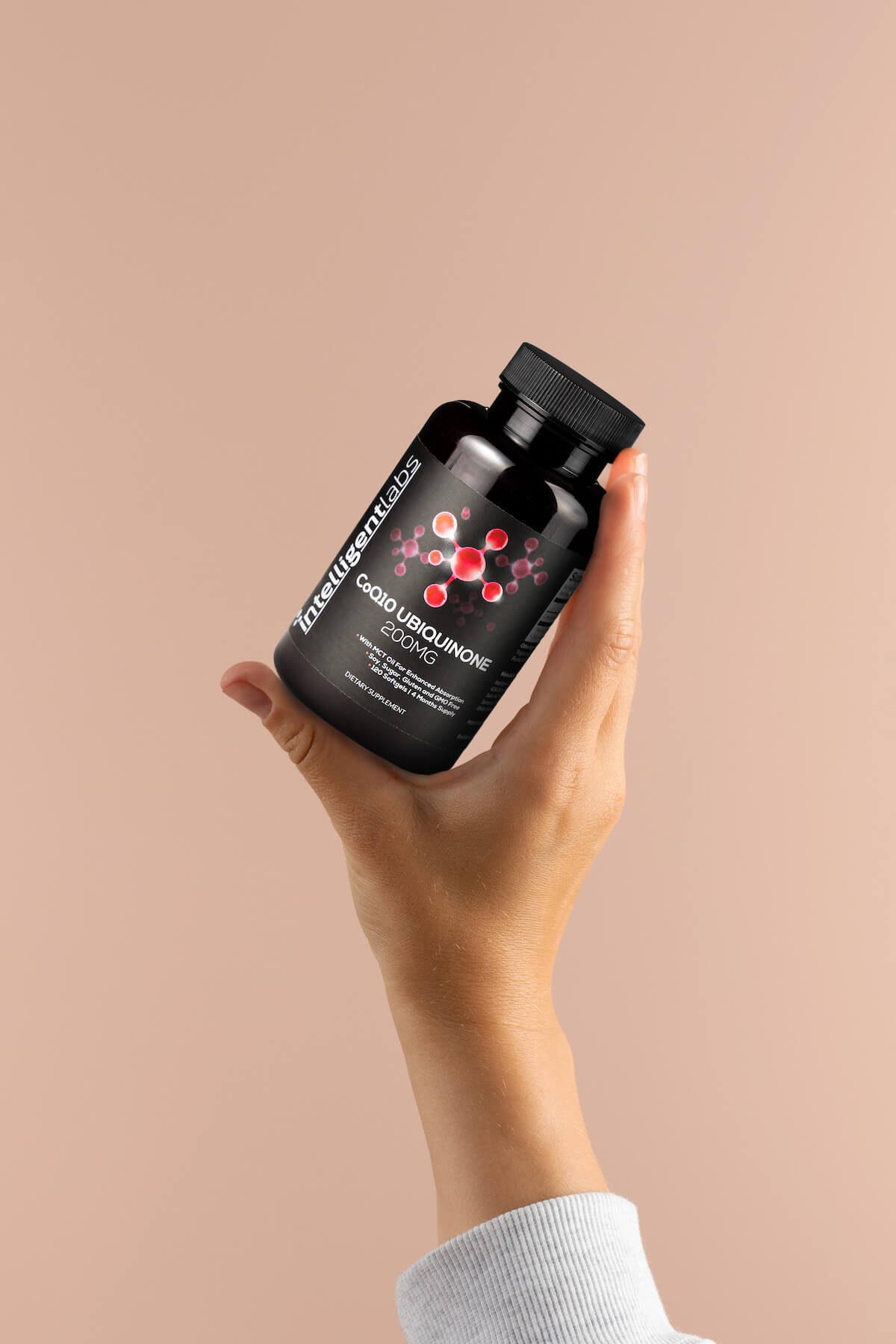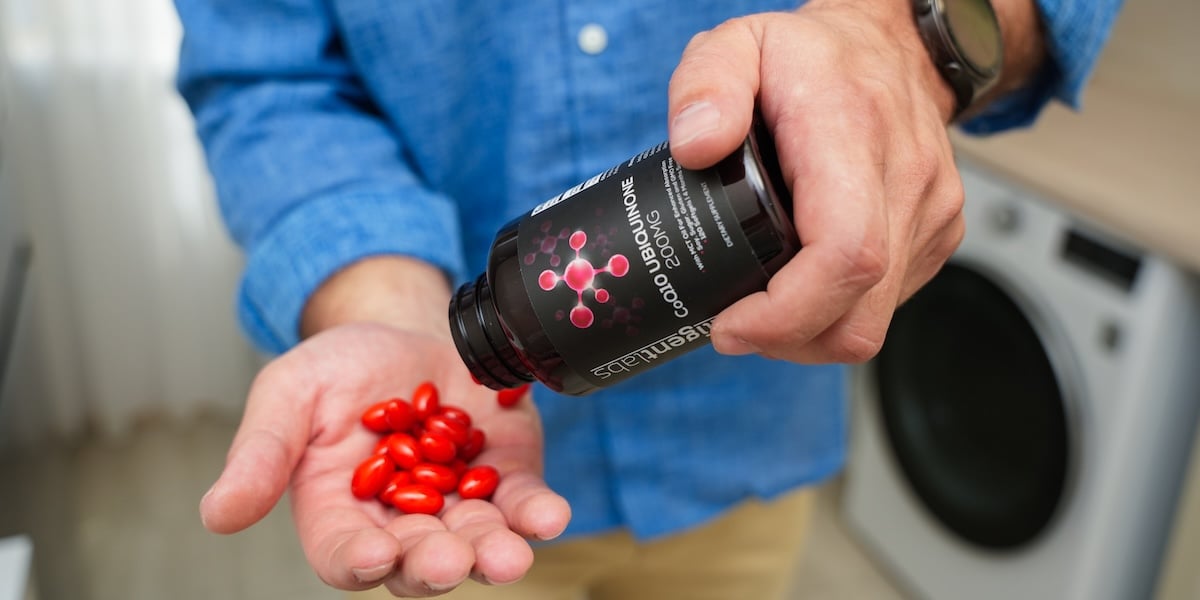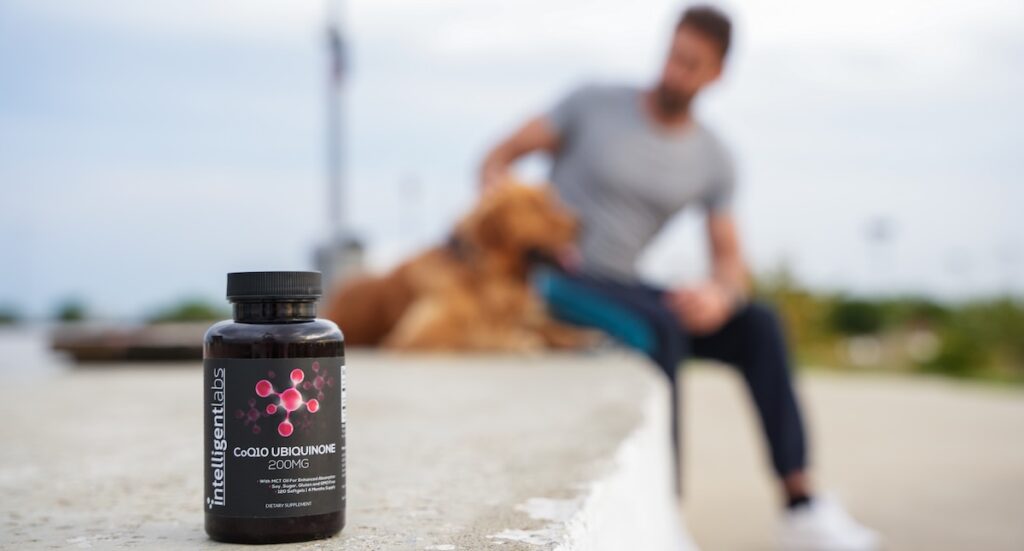Antioxidants
CoQ10 Ubiquinone: The Ultimate Guide To The Best CoQ10 Supplement
We all have those days where no amount of coffee seems to cut it. Fortunately, there’s more to boosting energy than a caffeine fix. Meet CoQ10 — a nutrient that helps fuel your cells and supports overall well-being. In this guide, we’ll show you how CoQ10 works, why it matters, and how to choose the best CoQ10 supplement for your lifestyle. Let’s dive in!
Table of Contents
First, what exactly is CoQ10?
Coenzyme Q10 (CoQ10) is a vitamin-like molecule found in nearly every cell, especially in energy-demanding organs like the brain, heart, lungs, kidneys, and liver.
Also called Ubiquinone or Ubiquinol, it primarily resides in the mitochondria (the cell’s powerhouses). Each cell contains a few thousand mitochondria.1 With over 30 trillion cells in the body, CoQ10 is everywhere, yet your total stores only amount to about 500–1500 mg.2 3
CoQ10 helps produce ATP, the cell’s “energy currency” used for muscle contractions, nerve signals, chemical reactions, and even DNA and RNA synthesis. Beyond fueling your cells, CoQ10 also serves as a key antioxidant, safeguarding DNA, lipids, and proteins from free radical damage.4
What are the signs of low CoQ10 levels and who’s at risk?
Low CoQ10 can manifest as mental and physical fatigue, muscle weakness, or even high blood pressure. In severe cases, deficiencies might contribute to organ, brain, kidney, or eye issues. Conditions like Alzheimer’s, Parkinson’s, and Huntington’s have also been linked to low CoQ10 levels.5
While most people maintain adequate levels, certain groups are more vulnerable:
Primary Deficiencies: Genetic mutations affecting one or more of the 10+ genes involved in CoQ10 production can lead to low levels.
Secondary Deficiencies: These develop over time and are more common in older adults. People with diabetes, cancer, heart disease, chronic kidney disease, or metabolic syndrome — and those taking cholesterol-lowering medications — are particularly at risk.6
How to replenish CoQ10 levels? What are the best sources of CoQ10?
While your body naturally produces CoQ10, its production slows as you age, affecting your cells, tissues, and organs. You can boost your CoQ10 levels through your diet – with organ meats, fatty fish, fruits, vegetables, whole grains, nuts, and healthy oils all providing small amounts.7 8 For example, a kilogram of beef heart offers roughly 113 mg of CoQ10, and a kilogram of tuna only about 5 mg.

Because these food sources contain relatively low amounts of CoQ10, many people choose supplementation to quickly and effectively raise their levels.
Why choose our Intelligent Labs CoQ10 supplement?
A targeted CoQ10 supplement can provide a concentrated dose. In our case, 200 mg of CoQ10 in its stable Ubiquinone form, packed into each softgel. Softgels are known for their excellent bioavailability, and we’ve enhanced our formula with coconut-derived MCT oil to boost absorption even further.
Other key features include:
- Clean formula: Our supplement is free from soy, sugar, gluten, and GMOs.
- Convenient supply: Each bottle contains 120 softgels – a 4-month supply when taken as recommended (1 softgel per day).
- Produced at an NSF GMP-certified facility in the United States.
- Third-party lab testing to ensure purity and consistency.
Whole foods are essential for a balanced diet. But if you’re specifically looking to increase your CoQ10 levels for energy and heart health, supplementation is a practical option.
What are the benefits of taking CoQ10 supplements?
Taking CoQ10 supplements can boost your body’s levels faster than relying on food alone — and that’s a big win when it comes to overall health. Here’s what you might experience when you add the best CoQ10 supplement to your routine:
1. CoQ10 supplements may reduce fatigue and improve energy levels
CoQ10 plays a key role in powering up your cells, so it makes sense that supplementing with it can help reduce feelings of tiredness.
A systematic review of 13 studies found that CoQ10 significantly reduced fatigue in both healthy and sick individuals, with higher doses over longer periods yielding even greater improvements.9
CoQ10 may also help active folks recover faster from exercise, enhancing overall performance.10 11
2. CoQ10 may support cardiovascular health
The heart is one of the most energy-demanding organs, and low CoQ10 levels are common in patients with heart disease – up to 3 out of 4 patients, in fact.12
Research shows that CoQ10 supplementation can improve cardiovascular health. It may reduce the risk of heart attacks and strokes, and even help manage hypertension by improving blood flow in your arteries, veins, and capillaries.13 14 15
Related article: Which Is Better For Heart Health: CoQ10 or Fish Oil?
3. CoQ10 supplements may promote healthy cholesterol levels
Not all cholesterol is bad. Higher levels of HDL (the “good” cholesterol) and lower levels of LDL (the “bad” cholesterol) can protect your heart.
A literature review covering 50 studies demonstrated that CoQ10 supplementation positively influences lipid profiles by boosting HDL and reducing LDL, triglycerides, and total cholesterol.16
4. CoQ10 may help boost immune health
Low CoQ10 levels have been linked to a higher risk of infections. For example, kids with the flu often have lower CoQ10 compared to their healthier peers.17 In older adults, just 14 days of a 200 mg dose helped speed up recovery from pneumonia.18
During the recent COVID-19 pandemic, research found that people taking CoQ10 were significantly less likely to be hospitalized compared to similar individuals who weren’t supplementing.19
5. CoQ10 may help with fertility
For men, CoQ10 supplementation might enhance sperm quality and count, while for women it could improve egg quality and even boost pregnancy rates.20 21 More studies are needed to confirm CoQ10’s benefits for fertility, but the early signs are promising.
6. CoQ10 may support healthy cognitive function
While human trials are still in the works, animal studies have shown that CoQ10 supplementation can improve memory and learning. For instance, middle-aged diabetic rats showed enhanced cognitive performance after taking CoQ10. Similarly, even the healthy rats benefited from supplementation.22

Ubiquinone vs. Ubiquinol: What’s the best CoQ10 supplement form?
Both forms of CoQ10 – Ubiquinone and Ubiquinol – are essential antioxidants that help power up your cells. The main difference is that Ubiquinone is the oxidized (inactive) form, while Ubiquinol is the reduced (active) form.
So, does that make Ubiquinol the better choice? Not necessarily. Here’s why:
- Ubiquinol is patented and more expensive to produce than Ubiquinone
Ubiquinol is a patented form, meaning only one company produces it, which drives up the price. Brands that use Ubiquinol often sell their products at a higher price compared to Ubiquinone supplements.
- Ubiquinol is the reduced form and is less stable than Ubiquinone
Ubiquinol, being the reduced form, is less stable and more prone to oxidation when exposed to air or sunlight. When it oxidizes, it essentially turns into Ubiquinone. This makes Ubiquinone a more stable and reliable choice.
- The lion’s share of CoQ10 studies are on Ubiquinone, not Ubiquinol
Most of the extensive research on CoQ10 has been done on Ubiquinone. Scientists have been studying Ubiquinone for over 30 years – long before Ubiquinol was even introduced in 2006. Even today, the majority of studies focus on Ubiquinone.23
With that said, the body continuously converts CoQ10 into the form it needs. So even if you take a Ubiquinone supplement, your body will convert some of it to Ubiquinol as required.24 This means you can enjoy all the benefits without the extra cost associated with Ubiquinol.
What’s the best delivery format for CoQ10 supplements?
CoQ10 comes in many forms: softgels, gummies, capsules, tablets, syrups, and even powder. However, a 2019 study found that softgels, whether containing Ubiquinone or Ubiquinol, offer the highest bioavailability.25 In short, a softgel format helps ensure that your body absorbs and uses the CoQ10 effectively.
Are there any side effects to supplementing with CoQ10 Ubiquinone?
Long-term studies consistently show that CoQ10 is very safe, even when taken up to 1200 mg per day. While side effects are rare, some people might experience mild stomach upset, dizziness, irritability, headaches or migraines, and even insomnia.26
Is it safe to take CoQ10 during pregnancy?
Yes, CoQ10 is considered safe during pregnancy. In one clinical study, high-risk women taking 200 mg of CoQ10 daily from week 20 until birth experienced a reduced risk of pre-eclampsia.27
What’s the recommended dose – how much CoQ10 should you take daily?
There aren’t official universal guidelines for CoQ10 dosage, but here are some general recommendations from the American Family Physician:
- Mitochondrial issues: 150 mg per day or 2 mg per kg per day (up to 3,000 mg in some cases)
- Parkinson’s disease: 300 to 1,200 mg per day in four divided doses
- Cardiovascular issues: Typically 50 to 200 mg daily (though some reviews suggest 400–500 mg/day can have the best impact on cholesterol levels)
- Diabetes: 100 to 200 mg per day
For our CoQ10 Ubiquinone, one 200 mg softgel daily is typically sufficient for most people. As always, consult your doctor if you think you might need a different dose.
When’s the best time to take CoQ10? Morning or evening?
Because CoQ10 has energy-boosting benefits, taking it in the morning might be ideal for powering you through the day. That said, if you’re more of a night owl, taking it later can also work.
Just remember: CoQ10 is fat-soluble, so it should be taken with a meal containing some fat. Our softgels are formulated with MCT oil to enhance absorption, but even a little dietary fat can make a difference.
Conclusion
CoQ10 is a vital nutrient that fuels your cells and supports overall energy production. Factors like aging, disease, and certain medications can lower your natural CoQ10 levels. Fortunately, supplementing with our 200 mg Ubiquinone softgels can help replenish these levels, letting you take full advantage of all the science-backed benefits.
💬 We’d love to hear your thoughts or experiences with CoQ10. Feel free to add your comments below. Your feedback helps build our community and may even spark a great conversation!
📩 Want more quick, science-backed health tips? Sign up for our mailing list to receive expert insights straight to your inbox, plus exclusive offers just for subscribers!
References:
- Pizzorno, Joseph. “Mitochondria-Fundamental to Life and Health.” Integrative Medicine (Encinitas, Calif.), vol. 13, no. 2, 2014, pp. 8–15, www.ncbi.nlm.nih.gov/pmc/articles/PMC4684129/ ↩︎
- Zimmer, Carl. “How Many Cells Are in Your Body?” Science, 23 Oct. 2013, www.nationalgeographic.com/science/article/how-many-cells-are-in-your-body. ↩︎
- Saini, Rajiv. “Coenzyme Q10: The Essential Nutrient.” Journal of Pharmacy and Bioallied Sciences, vol. 3, no. 3, 2011, p. 466, www.ncbi.nlm.nih.gov/pmc/articles/PMC3178961/ ↩︎
- Dunn, Jacob, and Michael H. Grider. “Physiology, Adenosine Triphosphate (ATP).” PubMed, StatPearls Publishing, 17 Feb. 2022, www.ncbi.nlm.nih.gov/books/NBK553175/. ↩︎
- Manzar, Haider, et al. “Cellular Consequences of Coenzyme Q10 Deficiency in Neurodegeneration of the Retina and Brain.” International Journal of Molecular Sciences, vol. 21, no. 23, 6 Dec. 2020, p. 9299, https://doi.org/10.3390/ijms21239299 ↩︎
- Hargreaves, Iain, et al. “Disorders of Human Coenzyme Q10 Metabolism: An Overview.” International Journal of Molecular Sciences, vol. 21, no. 18, 13 Sept. 2020, p. 6695, https://doi.org/10.3390/ijms21186695 ↩︎
- “Coenzyme Q10.” Linus Pauling Institute, 28 Apr. 2014, lpi.oregonstate.edu/mic/dietary-factors/coenzyme-Q10#food-sources. ↩︎
- Smoller, Dr Neal. CoQ10 vs Ubiquinol: The Ultimate Guide – Dr. Neal Smoller, Holistic Pharmacist. drnealsmoller.com/blog/coq10-vs-ubiquinol-the-ultimate-guide/ ↩︎
- Tsai, I-Chen, et al. “Effectiveness of Coenzyme Q10 Supplementation for Reducing Fatigue: A Systematic Review and Meta-Analysis of Randomized Controlled Trials.” Frontiers in Pharmacology, vol. 13, 24 Aug. 2022, p. 883251, www.ncbi.nlm.nih.gov/pmc/articles/PMC9449413/ ↩︎
- Cooke, Matthew, et al. “Effects of Acute and 14-Day Coenzyme Q10 Supplementation on Exercise Performance in Both Trained and Untrained Individuals.” Journal of the International Society of Sports Nutrition, vol. 5, no. 1, 2008, p. 8, https://doi.org/10.1186/1550-2783-5-8. ↩︎
- Drobnic, Franchek, et al. “Coenzyme Q10 Supplementation and Its Impact on Exercise and Sport Performance in Humans: A Recovery or a Performance-Enhancing Molecule?” Nutrients, vol. 14, no. 9, 26 Apr. 2022, p. 1811, https://doi.org/10.3390/nu14091811. ↩︎
- Kumar, Adarsh, et al. “Role of Coenzyme Q10 (CoQ10) in Cardiac Disease, Hypertension and Meniere-like Syndrome.” Pharmacology & Therapeutics, vol. 124, no. 3, Dec. 2009, pp. 259–268, https://doi.org/10.1016/j.pharmthera.2009.07.003. ↩︎
- Zozina, Vladlena I., et al. “Coenzyme Q10 in Cardiovascular and Metabolic Diseases: Current State of the Problem.” Current Cardiology Reviews, vol. 14, no. 3, 1 Aug. 2018, pp. 164–174, www.ncbi.nlm.nih.gov/pmc/articles/PMC6131403/ ↩︎
- Rabanal-Ruiz, Yoana, et al. “The Use of Coenzyme Q10 in Cardiovascular Diseases.” Antioxidants, vol. 10, no. 5, 1 May 2021, p. 755, www.mdpi.com/2076-3921/10/5/755/htm ↩︎
- Singh, Ram B., et al. Cardiovascular Drugs and Therapy, vol. 12, no. 4, 1998, pp. 347–353, https://doi.org/10.1023/a:1007764616025. ↩︎
- Liu, Zhihao, et al. “Effects of Coenzyme Q10 Supplementation on Lipid Profiles in Adults: A Meta-Analysis of Randomized Controlled Trials.” The Journal of Clinical Endocrinology and Metabolism, vol. 108, no. 1, 7 Oct. 2022, pp. 232–249, https://doi.org/10.1210/clinem/dgac585 ↩︎
- Kelekçi, S., et al. “The Relationships between Clinical Outcome and the Levels of Total Antioxidant Capacity (TAC) and Coenzyme Q (CoQ 10) in Children with Pandemic Influenza (H 1 N1) and Seasonal Flu.” European Review for Medical and Pharmacological Sciences, vol. 16, no. 8, 1 Aug. 2012, pp. 1033–1038, pubmed.ncbi.nlm.nih.gov/22913153/. ↩︎
- Farazi, Aliasghar, et al. “Coenzyme Q10 Administration in Community-Acquired Pneumonia in the Elderly.” Iranian Red Crescent Medical Journal, vol. 16, no. 12, 1 Dec. 2014, www.ncbi.nlm.nih.gov/pmc/articles/PMC4341326/ ↩︎
- Israel, Ariel, et al. “Identification of Drugs Associated with Reduced Severity of COVID-19: A Case-Control Study in a Large Population.” MedRxiv, 24 Mar. 2021, p. 2020.10.13.20211953, www.ncbi.nlm.nih.gov/pmc/articles/PMC7574266/ ↩︎
- Ben-Meir, Assaf, et al. “Coenzyme Q10 Restores Oocyte Mitochondrial Function and Fertility during Reproductive Aging.” Aging Cell, vol. 14, no. 5, 1 Oct. 2015, pp. 887–895, pubmed.ncbi.nlm.nih.gov/26111777/ ↩︎
- Rodríguez-Varela, Cristina, and Elena Labarta. “Does Coenzyme Q10 Supplementation Improve Human Oocyte Quality?” International Journal of Molecular Sciences, vol. 22, no. 17, 2 Sept. 2021, p. 9541, https://doi.org/10.3390/ijms22179541. ↩︎
- Monsef, Amirreza, et al. “Influence of Chronic Coenzyme Q10 Supplementation on Cognitive Function, Learning, and Memory in Healthy and Diabetic Middle-Aged Rats.” Neuropsychobiology, vol. 77, no. 2, 21 Dec. 2018, pp. 92–100, https://doi.org/10.1159/000495520. ↩︎
- Madsen, B. “Ubiquinone or Ubiquinol – Does It Really Matter?” Healthandscience.eu, icqaproject.org/wp-content/uploads/bsk-pdf-manager/22_10_GB_UBIQINOL_UNIQINOL_FACTSHEET_A4_1014-2.PDF. ↩︎
- Pravst, Igor, et al. “Comparative Bioavailability of Different Coenzyme Q10 Formulations in Healthy Elderly Individuals.” Nutrients, vol. 12, no. 3, 16 Mar. 2020, p. 784, dx.doi.org/10.3390%2Fnu12030784 ↩︎
- López-Lluch, Guillermo, et al. “Bioavailability of Coenzyme Q10 Supplements Depends on Carrier Lipids and Solubilization.” Nutrition, vol. 57, Jan. 2019, pp. 133–140, https://doi.org/10.1016/j.nut.2018.05.020. ↩︎
- Sood, Brittany, and Michael Keenaghan. “Coenzyme Q10.” Nih.gov, StatPearls Publishing, Oct. 2019, www.ncbi.nlm.nih.gov/books/NBK531491/. ↩︎
- Teran, Enrique, et al. “Coenzyme Q10 Supplementation during Pregnancy Reduces the Risk of Pre-Eclampsia.” International Journal of Gynaecology and Obstetrics: The Official Organ of the International Federation of Gynaecology and Obstetrics, vol. 105, no. 1, 1 Apr. 2009, pp. 43–45, https://doi.org/10.1016/j.ijgo.2008.11.033. ↩︎




